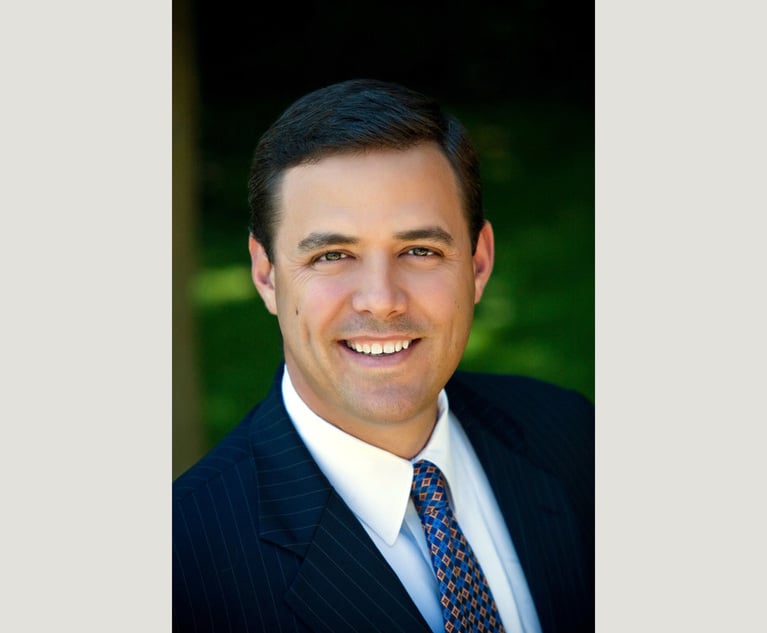What's Next for DNA Privacy: Catching Killers, Ancestry Sites and the Fourth Amendment
A Q&A with Marcia Hofmann of Zeitgeist Law on Fourth Amendment protections, insurance considerations and other legal questions that arise when companies control genetic data.
February 14, 2019 at 03:26 PM
6 minute read
The following Q&A is an excerpt from Law.com's What's Next briefing, a weekly newsletter on the future of law. Over the coming weeks, we're checking in with legal futurists, technologists and other experts for perspectives on the thorny issues that arise where new tech meets old laws. Click here to learn more about Law.com briefings.
Millions of individuals have sent saliva samples to commercial genetics testing companies looking for information on their health profile and ancestry. Those consumers likely weren't imagining a day when police could use that information to help identify suspects based on DNA evidence.
But that day has arrived and, like so many issues spurred by technological advances, the law is playing catch up.
Marcia Hofmann, founder of Zeitgeist Law in San Francisco and special counsel to the Electronic Frontier Foundation, has been paying attention to the emerging legal questions. We checked in with her to explore the issues and a possible framework for regulating access to genetic information.
We've been hearing recently about police looking to genetic and ancestry sites like 23andMe or Ancestry.com to solve cases. In what ways is this a legal gray area?
Hofmann: More and more people choose to share DNA samples and profiles in hopes of learning about their backgrounds and perhaps discovering new family. I think it came as a surprise to many that investigators are using this information to solve crimes.
That raises an interesting question: Should there be limits on whether, how, and when the police can use genetic information that people share with ancestry sites?
At this point, any limits on the federal level would come from Fourth Amendment, which generally requires investigators to get a warrant to perform a search that intrudes on a reasonable expectation of privacy. Historically, the Supreme Court has said people don't have a reasonable expectation of privacy in things they voluntarily share with third parties, which would suggest the Fourth Amendment doesn't offer much protection here.
And yet the Fourth Amendment landscape has shifted radically over the last few years in a string of cases where the Supreme Court has re-visited old rules in light of new technologies. For example, just last year in Carpenter v. United States, the majority said that at least some information is so unique and intimate that disclosing it to others doesn't snuff out expectations of privacy.
So when it comes to genetic information shared with ancestry sites, maybe there's potential for Fourth Amendment theories that wouldn't have seemed all that viable before. Are genetic information and familial connections so inherently sensitive that a warrant should be a default Fourth Amendment requirement, even if a person shares their DNA profile with others through an ancestry site? When police access a person's genetic information shared with a company, could that be considered a form trespass on personhood or property that requires a warrant? The Supreme Court's recent opinions suggest some interesting directions to take these theories.
It's hard to argue against using every tool available to solve violent crimes. And yet, there's clearly tension here with individual expectations of privacy. Do you think legislation will be required to set an appropriate balance—and what might that look like?
Hofmann: I think legislation is definitely a possibility — plus it could be crafted to include special protections above and beyond what the Fourth Amendment might offer.
Legislation could require law enforcement to get a warrant before collecting DNA information from ancestry sites for criminal investigations, and if the legislature saw fit, it could include requirements beyond a showing a probable cause (as the Wiretap Act does). For example, the law might require searches of genetic information to be done in a way that minimizes the privacy impact on people whose information isn't relevant to an investigation.
Legislation could also limit how ancestry and genetic testing companies can share genetic information with third parties other than law enforcement. And it could require opt-in consent from users before information can be shared for purposes other than what it was originally collected for.
We're nearing a day, according to researchers, when basically everyone's DNA can be matched regardless of whether they've ever used one of these commercial services. Is this likely to be a complicating factor in the Fourth Amendment analysis?
Hofmann: It is a complicating factor, but the Fourth Amendment test evolves over time. It has the flexibility to adjust to advances in technology and shifts in societal norms.
I imagine that if Fourth Amendment protection were to cover genetic material provided voluntarily by a distant relative, the theory would be based on an expectation of privacy in family relationships or maybe personhood. It might be a particularly important factor that the suspect never consented to the relative's decision to offer up the genetic material, since the suspect wouldn't have done anything to diminish their own expectation of privacy.
I could also see a Fourth Amendment theory based on the idea that genetic information is so inherently sensitive that a warrant is required to search it by default. That's the rule we have now for cell phones after Riley v. California.
Outside of the criminal law arena, are there worrisome implications related to the growth of what's essentially a global DNA registry controlled by commercial entities?
Hofmann: Absolutely. It's critically important to make sure commercial entities don't use predictive genetic information to deny individuals—or entire families— insurance, employment, health care, the freedom to make their own life choices, etc. We already have some laws, such as the Genetic Information Nondiscrimination Act and state statutes, that limit genetic discrimination to varying extents. But those laws need to be agile and keep up as genetic technology develops and new use cases arise.
And what happens if genetic testing and ancestry companies partner up with businesses in other industries, or get acquired, or go bankrupt? Could all that genetic information be put to different uses that consumers didn't agree to? The idea of finding new uses for consumer genetic information isn't purely hypothetical—for instance, 23andMe already has collaborations with pharmaceutical companies to help develop new drugs. Regulators will need to keep a close eye on the re-purposing of genetic information to make sure people and their blood relatives don't suffer unavoidable harms.
➤ We hope you enjoyed this excerpt from What's Next. View the briefing archive.
This content has been archived. It is available through our partners, LexisNexis® and Bloomberg Law.
To view this content, please continue to their sites.
Not a Lexis Subscriber?
Subscribe Now
Not a Bloomberg Law Subscriber?
Subscribe Now
NOT FOR REPRINT
© 2025 ALM Global, LLC, All Rights Reserved. Request academic re-use from www.copyright.com. All other uses, submit a request to [email protected]. For more information visit Asset & Logo Licensing.
You Might Like
View All
How I Made Office Managing Partner: 'Stay Focused on Building Strong Relationships,' Says Joseph Yaffe of Skadden

US Patent Innovators Can Look to International Trade Commission Enforcement for Protection, IP Lawyers Say

How the Deal Got Done: Sidley Austin and NWSL Angel City Football Club/Iger

How Uncertainty in College Athletics Compensation Could Drive Lawsuits in 2025
Trending Stories
- 1US DOJ Threatens to Prosecute Local Officials Who Don't Aid Immigration Enforcement
- 2Kirkland Is Entering a New Market. Will Its Rates Get a Warm Welcome?
- 3African Law Firm Investigated Over ‘AI-Generated’ Case References
- 4Gen AI and Associate Legal Writing: Davis Wright Tremaine's New Training Model
- 5Departing Attorneys Sue Their Former Law Firm
Who Got The Work
J. Brugh Lower of Gibbons has entered an appearance for industrial equipment supplier Devco Corporation in a pending trademark infringement lawsuit. The suit, accusing the defendant of selling knock-off Graco products, was filed Dec. 18 in New Jersey District Court by Rivkin Radler on behalf of Graco Inc. and Graco Minnesota. The case, assigned to U.S. District Judge Zahid N. Quraishi, is 3:24-cv-11294, Graco Inc. et al v. Devco Corporation.
Who Got The Work
Rebecca Maller-Stein and Kent A. Yalowitz of Arnold & Porter Kaye Scholer have entered their appearances for Hanaco Venture Capital and its executives, Lior Prosor and David Frankel, in a pending securities lawsuit. The action, filed on Dec. 24 in New York Southern District Court by Zell, Aron & Co. on behalf of Goldeneye Advisors, accuses the defendants of negligently and fraudulently managing the plaintiff's $1 million investment. The case, assigned to U.S. District Judge Vernon S. Broderick, is 1:24-cv-09918, Goldeneye Advisors, LLC v. Hanaco Venture Capital, Ltd. et al.
Who Got The Work
Attorneys from A&O Shearman has stepped in as defense counsel for Toronto-Dominion Bank and other defendants in a pending securities class action. The suit, filed Dec. 11 in New York Southern District Court by Bleichmar Fonti & Auld, accuses the defendants of concealing the bank's 'pervasive' deficiencies in regards to its compliance with the Bank Secrecy Act and the quality of its anti-money laundering controls. The case, assigned to U.S. District Judge Arun Subramanian, is 1:24-cv-09445, Gonzalez v. The Toronto-Dominion Bank et al.
Who Got The Work
Crown Castle International, a Pennsylvania company providing shared communications infrastructure, has turned to Luke D. Wolf of Gordon Rees Scully Mansukhani to fend off a pending breach-of-contract lawsuit. The court action, filed Nov. 25 in Michigan Eastern District Court by Hooper Hathaway PC on behalf of The Town Residences LLC, accuses Crown Castle of failing to transfer approximately $30,000 in utility payments from T-Mobile in breach of a roof-top lease and assignment agreement. The case, assigned to U.S. District Judge Susan K. Declercq, is 2:24-cv-13131, The Town Residences LLC v. T-Mobile US, Inc. et al.
Who Got The Work
Wilfred P. Coronato and Daniel M. Schwartz of McCarter & English have stepped in as defense counsel to Electrolux Home Products Inc. in a pending product liability lawsuit. The court action, filed Nov. 26 in New York Eastern District Court by Poulos Lopiccolo PC and Nagel Rice LLP on behalf of David Stern, alleges that the defendant's refrigerators’ drawers and shelving repeatedly break and fall apart within months after purchase. The case, assigned to U.S. District Judge Joan M. Azrack, is 2:24-cv-08204, Stern v. Electrolux Home Products, Inc.
Featured Firms
Law Offices of Gary Martin Hays & Associates, P.C.
(470) 294-1674
Law Offices of Mark E. Salomone
(857) 444-6468
Smith & Hassler
(713) 739-1250








